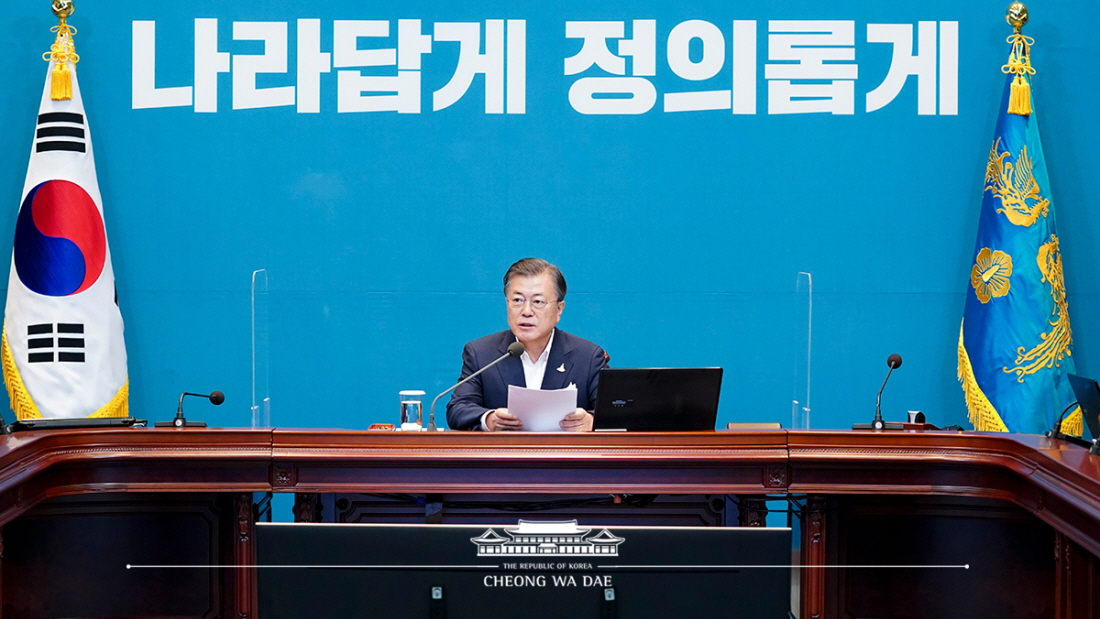이 웹사이트는 제19대 대통령 임기 종료에 따라 대통령기록관이 「대통령기록물 관리에 관한 법률」에 의해 이관받아 서비스하는 대통령기록물입니다. 자료의 열람만 가능하며 수정 · 추가 · 삭제는 불가능합니다.
다만, 「개인정보보호법」에 의하여 개인의 정보를 보호받기 원하시는 분은 관련 내용(요청자, 요청내용, 연락처, 글위치)을 대통령 웹기록물 담당자(044-211-2253)에게 요청해 주시면 신속히 검토하여 조치해 드리겠습니다. 감사합니다.
SPEECHES & REMARKS
BRIEFINGS
Opening Remarks by President Moon Jae-in at Meeting with His Senior Secretaries

The Government has partially downgraded its epidemic prevention and control measures in the Seoul metropolitan area effective today. Under the premise that Level 2 social distancing will be maintained more strictly, the Government and experts – after compiling the opinions of people on the ground – have decided on a practical approach in order to protect people from both an economic collapse and COVID-19 in their daily lives.
In particular, our focus is on easing restrictions on the facilities that are crucial for low-income business owners’ operations and livelihoods. This is a minimal action that will allow small- and microbusiness owners and the self-employed, who have been driven to their limits, to maintain a living without giving up their livelihoods while we stay vigilant in our disease fighting efforts. I hope the people understand the inevitability of this decision to minimize the economic impact as we maintain a thorough and rigorous epidemic prevention and control mechanism.
These adjusted epidemic prevention and control measures have been deemed reasonable primarily because the enhanced measures to date are taking effect. The national daily caseload that once surged past 400 has steadily dwindled to around 100. The daily count of confirmed cases in the Seoul metropolitan area, the epicenter of the COVID-19 resurgence, has significantly decreased. The basic reproduction number – a measurement no less important than the number of new confirmed cases – has also recently dropped to approximately 0.7 infections per carrier.
We still cannot feel at ease in our current situation, but the resurgence of COVID-19 over the past month can be said to be slowly subsiding. To get to this point, epidemic prevention and control authorities and medical professionals have worked very hard. There were also huge inconveniences and sacrifices that our people had to bear behind the scenes. I’d like to express my deepest respect and gratitude once again to the people and, at the same time, my sincere regret; they have cooperated with the Government’s essential steps to strengthen epidemic prevention and control measures while enduring considerable damage and discomfort.
We have determined that the domestic COVID-19 situation remains at a level that can be controlled by our epidemic prevention and control system. In addition, we cannot thoughtlessly keep forcing sacrifices upon those facing a threat to their livelihoods from long-term restrictions and the suspension of business. This is yet another reason why we had to make adjustments to the epidemic prevention and control measures. We had no other option but to respond to their desperate cries about their possible collapse from economic distress before succumbing to COVID-19. We hope that these adjusted measures, albeit limited, will help resuscitate business and maintain their livelihoods.
The fourth supplementary budget proposal, which we are now urgently pursuing, has been drawn up with the same purpose in mind. We have focused on protecting the livelihoods of small- and microbusiness owners and the self-employed and on bringing them hope. In addition to the supplementary budget, we will also do all that we can to provide financial support and help alleviate rent burdens.
The battle against COVID-19 is a prolonged war. The Government cannot neglect either epidemic prevention and control or the economy as we are in a situation where we have to live with COVID-19 for an extended period of time. Epidemic prevention and control is not incompatible with the economy, but it cannot solve the problem of how to make a living. We have to find a way to make epidemic prevention and the economy compatible, thereby safeguarding the people’s lives and daily living. Until the COVID-19 pandemic ends, we have no choice but to maintain a delicate balance between epidemic prevention measures and the economy. The Government will succeed on both fronts without fail. If the people work together, we will be able to return more quickly to normal daily routines and economic activities.
Everyone is going through hardships due to COVID-19, but in times like these, we need to be compassionate and look after our needier neighbors. Especially with an increase in contact-free economic activities, demand for door-to-door deliveries has been surging. Making matters worse, the workloads of couriers will explode in the lead up to the Chuseok holiday. We have to pay special attention to the issues of their safety and exhaustion from overwork. In particular, as the Government is encouraging sending domestic agricultural and fishery products as Chuseok gifts, the amount of parcel delivery is likely to increase further before the holiday. I urge relevant ministries and agencies to strengthen labor oversight, so couriers do not suffer from overwork. I’d also like to see their efforts create a safer work environment, for example, by having more temporary workers added following onsite inspections.



